Law of Contract Case Study: Offer, Acceptance, and Remedies Analysis
VerifiedAdded on 2023/03/23
|7
|1327
|97
Case Study
AI Summary
This case study delves into a contract law scenario involving the sale of a van, focusing on the elements of offer and acceptance, the capacity of the parties (specifically, the buyer's age), and potential remedies for breach of contract. The initial issue revolves around whether a binding contract was formed despite the buyer being a minor and whether the seller could unilaterally alter the agreed-upon price. The analysis applies relevant legal rules regarding offer, acceptance, revocation, and the contractual capacity of minors, ultimately concluding that the buyer has a strong claim based on the principle that the contract was beneficial for the minor's future employment. Furthermore, the case study considers the remedies available to the buyer, suggesting that the court may order specific performance of the contract, compelling the seller to deliver the van as originally agreed, or award damages to compensate the buyer for losses incurred due to the seller's breach. Desklib offers similar solved assignments and resources for students.
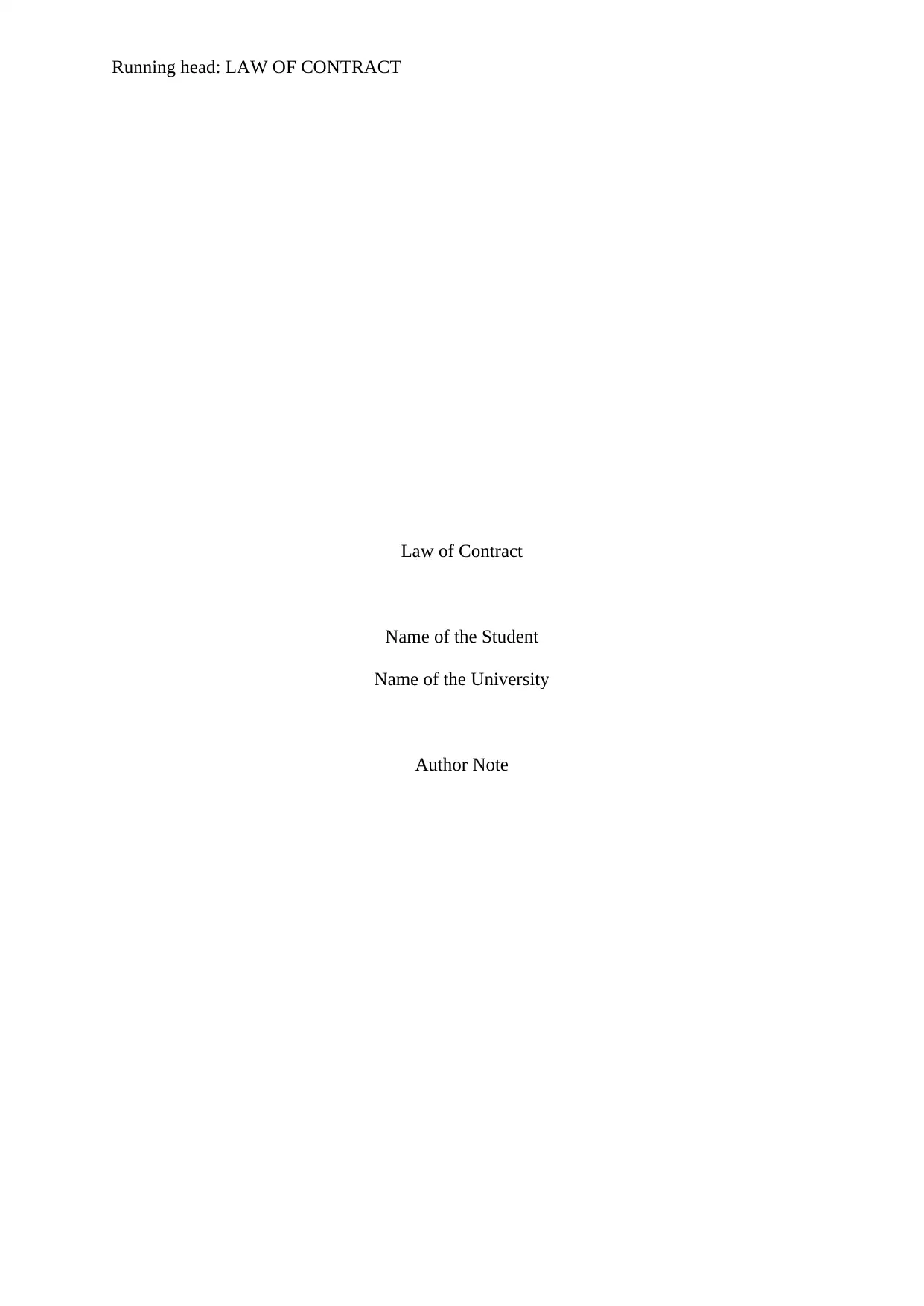
Running head: LAW OF CONTRACT
Law of Contract
Name of the Student
Name of the University
Author Note
Law of Contract
Name of the Student
Name of the University
Author Note
Paraphrase This Document
Need a fresh take? Get an instant paraphrase of this document with our AI Paraphraser

1LAW OF CONTRACT
Table of Contents
Question 1......................................................................................................................2
Question 2......................................................................................................................4
Reference List................................................................................................................6
Table of Contents
Question 1......................................................................................................................2
Question 2......................................................................................................................4
Reference List................................................................................................................6
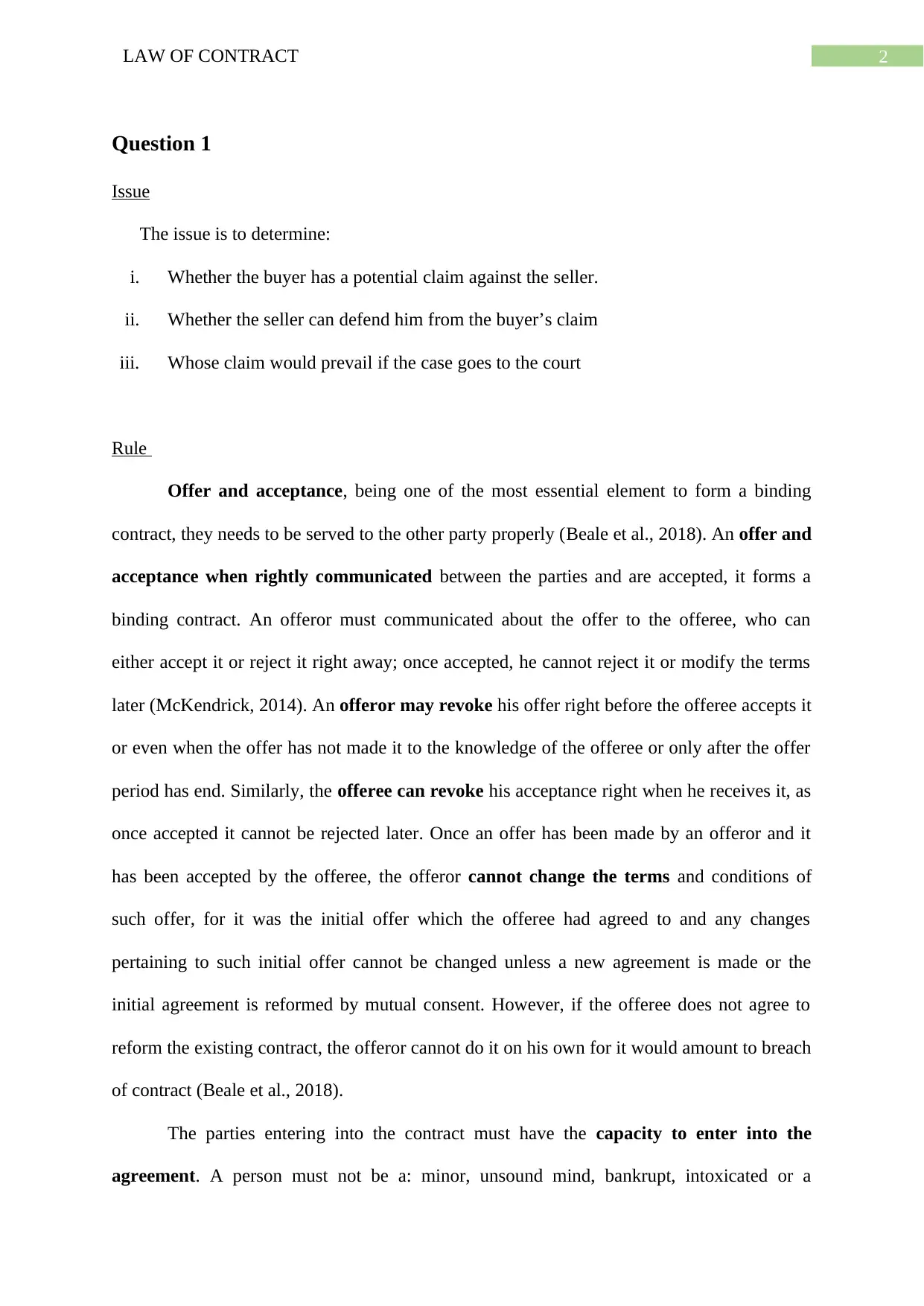
2LAW OF CONTRACT
Question 1
Issue
The issue is to determine:
i. Whether the buyer has a potential claim against the seller.
ii. Whether the seller can defend him from the buyer’s claim
iii. Whose claim would prevail if the case goes to the court
Rule
Offer and acceptance, being one of the most essential element to form a binding
contract, they needs to be served to the other party properly (Beale et al., 2018). An offer and
acceptance when rightly communicated between the parties and are accepted, it forms a
binding contract. An offeror must communicated about the offer to the offeree, who can
either accept it or reject it right away; once accepted, he cannot reject it or modify the terms
later (McKendrick, 2014). An offeror may revoke his offer right before the offeree accepts it
or even when the offer has not made it to the knowledge of the offeree or only after the offer
period has end. Similarly, the offeree can revoke his acceptance right when he receives it, as
once accepted it cannot be rejected later. Once an offer has been made by an offeror and it
has been accepted by the offeree, the offeror cannot change the terms and conditions of
such offer, for it was the initial offer which the offeree had agreed to and any changes
pertaining to such initial offer cannot be changed unless a new agreement is made or the
initial agreement is reformed by mutual consent. However, if the offeree does not agree to
reform the existing contract, the offeror cannot do it on his own for it would amount to breach
of contract (Beale et al., 2018).
The parties entering into the contract must have the capacity to enter into the
agreement. A person must not be a: minor, unsound mind, bankrupt, intoxicated or a
Question 1
Issue
The issue is to determine:
i. Whether the buyer has a potential claim against the seller.
ii. Whether the seller can defend him from the buyer’s claim
iii. Whose claim would prevail if the case goes to the court
Rule
Offer and acceptance, being one of the most essential element to form a binding
contract, they needs to be served to the other party properly (Beale et al., 2018). An offer and
acceptance when rightly communicated between the parties and are accepted, it forms a
binding contract. An offeror must communicated about the offer to the offeree, who can
either accept it or reject it right away; once accepted, he cannot reject it or modify the terms
later (McKendrick, 2014). An offeror may revoke his offer right before the offeree accepts it
or even when the offer has not made it to the knowledge of the offeree or only after the offer
period has end. Similarly, the offeree can revoke his acceptance right when he receives it, as
once accepted it cannot be rejected later. Once an offer has been made by an offeror and it
has been accepted by the offeree, the offeror cannot change the terms and conditions of
such offer, for it was the initial offer which the offeree had agreed to and any changes
pertaining to such initial offer cannot be changed unless a new agreement is made or the
initial agreement is reformed by mutual consent. However, if the offeree does not agree to
reform the existing contract, the offeror cannot do it on his own for it would amount to breach
of contract (Beale et al., 2018).
The parties entering into the contract must have the capacity to enter into the
agreement. A person must not be a: minor, unsound mind, bankrupt, intoxicated or a
⊘ This is a preview!⊘
Do you want full access?
Subscribe today to unlock all pages.

Trusted by 1+ million students worldwide
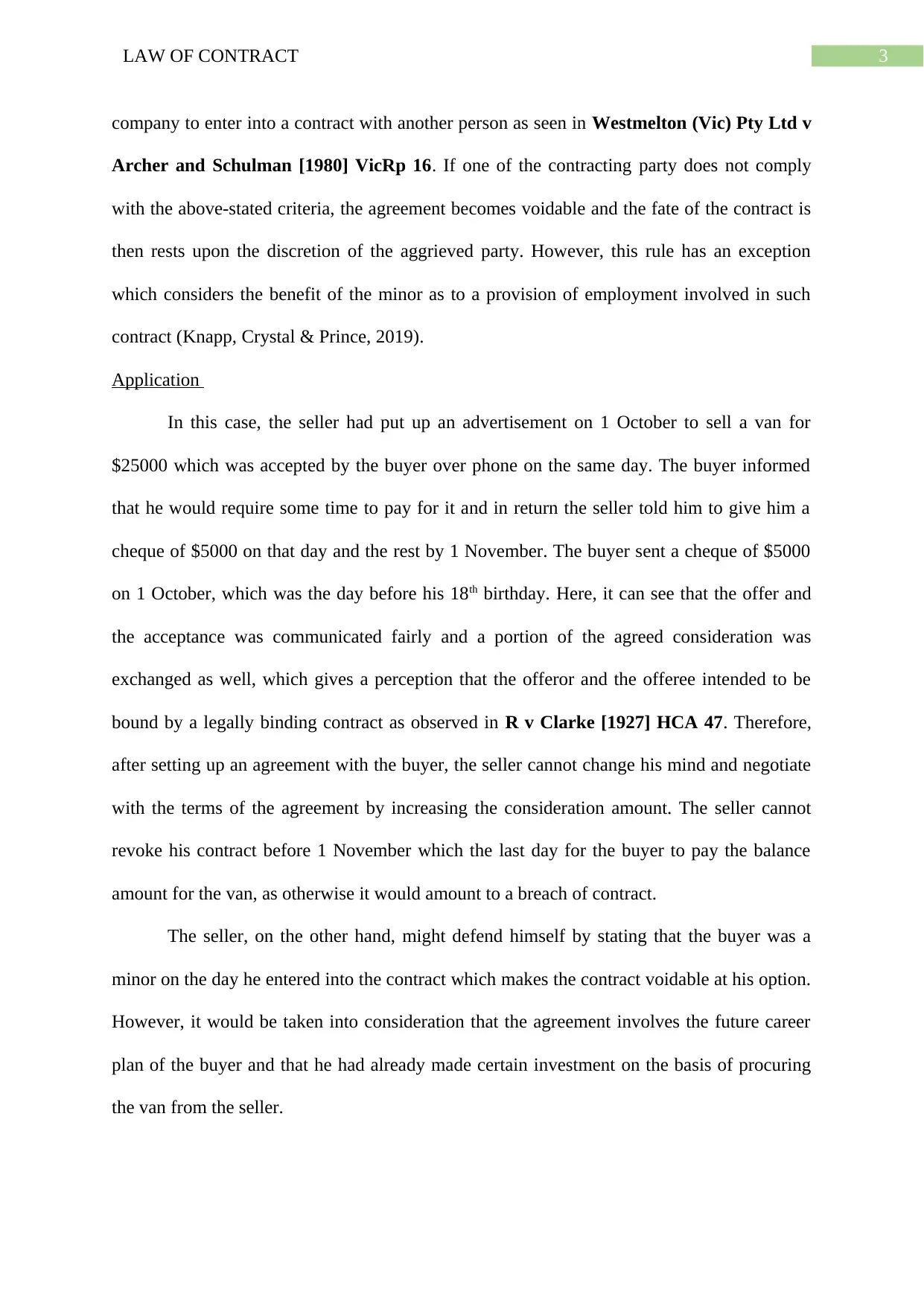
3LAW OF CONTRACT
company to enter into a contract with another person as seen in Westmelton (Vic) Pty Ltd v
Archer and Schulman [1980] VicRp 16. If one of the contracting party does not comply
with the above-stated criteria, the agreement becomes voidable and the fate of the contract is
then rests upon the discretion of the aggrieved party. However, this rule has an exception
which considers the benefit of the minor as to a provision of employment involved in such
contract (Knapp, Crystal & Prince, 2019).
Application
In this case, the seller had put up an advertisement on 1 October to sell a van for
$25000 which was accepted by the buyer over phone on the same day. The buyer informed
that he would require some time to pay for it and in return the seller told him to give him a
cheque of $5000 on that day and the rest by 1 November. The buyer sent a cheque of $5000
on 1 October, which was the day before his 18th birthday. Here, it can see that the offer and
the acceptance was communicated fairly and a portion of the agreed consideration was
exchanged as well, which gives a perception that the offeror and the offeree intended to be
bound by a legally binding contract as observed in R v Clarke [1927] HCA 47. Therefore,
after setting up an agreement with the buyer, the seller cannot change his mind and negotiate
with the terms of the agreement by increasing the consideration amount. The seller cannot
revoke his contract before 1 November which the last day for the buyer to pay the balance
amount for the van, as otherwise it would amount to a breach of contract.
The seller, on the other hand, might defend himself by stating that the buyer was a
minor on the day he entered into the contract which makes the contract voidable at his option.
However, it would be taken into consideration that the agreement involves the future career
plan of the buyer and that he had already made certain investment on the basis of procuring
the van from the seller.
company to enter into a contract with another person as seen in Westmelton (Vic) Pty Ltd v
Archer and Schulman [1980] VicRp 16. If one of the contracting party does not comply
with the above-stated criteria, the agreement becomes voidable and the fate of the contract is
then rests upon the discretion of the aggrieved party. However, this rule has an exception
which considers the benefit of the minor as to a provision of employment involved in such
contract (Knapp, Crystal & Prince, 2019).
Application
In this case, the seller had put up an advertisement on 1 October to sell a van for
$25000 which was accepted by the buyer over phone on the same day. The buyer informed
that he would require some time to pay for it and in return the seller told him to give him a
cheque of $5000 on that day and the rest by 1 November. The buyer sent a cheque of $5000
on 1 October, which was the day before his 18th birthday. Here, it can see that the offer and
the acceptance was communicated fairly and a portion of the agreed consideration was
exchanged as well, which gives a perception that the offeror and the offeree intended to be
bound by a legally binding contract as observed in R v Clarke [1927] HCA 47. Therefore,
after setting up an agreement with the buyer, the seller cannot change his mind and negotiate
with the terms of the agreement by increasing the consideration amount. The seller cannot
revoke his contract before 1 November which the last day for the buyer to pay the balance
amount for the van, as otherwise it would amount to a breach of contract.
The seller, on the other hand, might defend himself by stating that the buyer was a
minor on the day he entered into the contract which makes the contract voidable at his option.
However, it would be taken into consideration that the agreement involves the future career
plan of the buyer and that he had already made certain investment on the basis of procuring
the van from the seller.
Paraphrase This Document
Need a fresh take? Get an instant paraphrase of this document with our AI Paraphraser
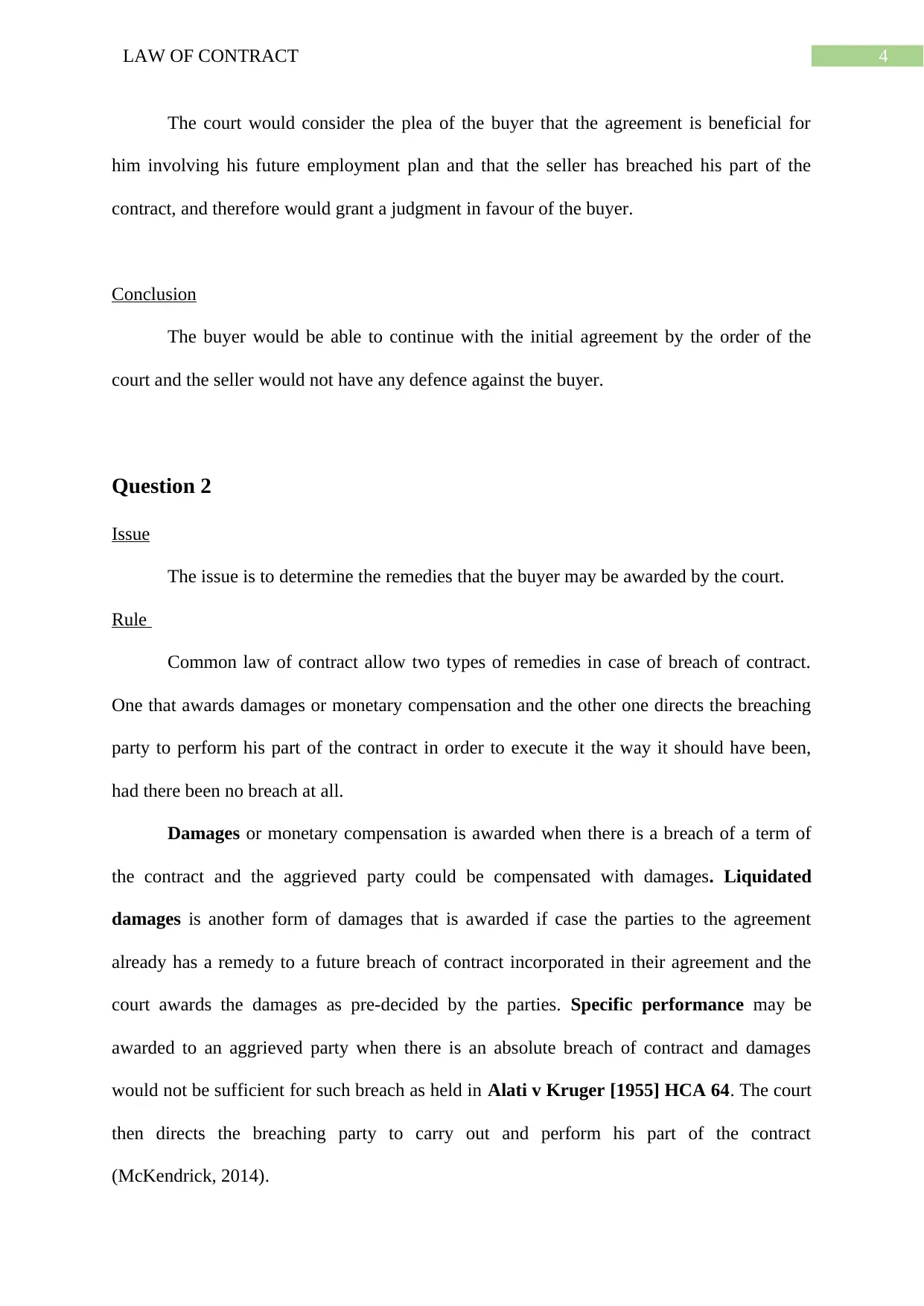
4LAW OF CONTRACT
The court would consider the plea of the buyer that the agreement is beneficial for
him involving his future employment plan and that the seller has breached his part of the
contract, and therefore would grant a judgment in favour of the buyer.
Conclusion
The buyer would be able to continue with the initial agreement by the order of the
court and the seller would not have any defence against the buyer.
Question 2
Issue
The issue is to determine the remedies that the buyer may be awarded by the court.
Rule
Common law of contract allow two types of remedies in case of breach of contract.
One that awards damages or monetary compensation and the other one directs the breaching
party to perform his part of the contract in order to execute it the way it should have been,
had there been no breach at all.
Damages or monetary compensation is awarded when there is a breach of a term of
the contract and the aggrieved party could be compensated with damages. Liquidated
damages is another form of damages that is awarded if case the parties to the agreement
already has a remedy to a future breach of contract incorporated in their agreement and the
court awards the damages as pre-decided by the parties. Specific performance may be
awarded to an aggrieved party when there is an absolute breach of contract and damages
would not be sufficient for such breach as held in Alati v Kruger [1955] HCA 64. The court
then directs the breaching party to carry out and perform his part of the contract
(McKendrick, 2014).
The court would consider the plea of the buyer that the agreement is beneficial for
him involving his future employment plan and that the seller has breached his part of the
contract, and therefore would grant a judgment in favour of the buyer.
Conclusion
The buyer would be able to continue with the initial agreement by the order of the
court and the seller would not have any defence against the buyer.
Question 2
Issue
The issue is to determine the remedies that the buyer may be awarded by the court.
Rule
Common law of contract allow two types of remedies in case of breach of contract.
One that awards damages or monetary compensation and the other one directs the breaching
party to perform his part of the contract in order to execute it the way it should have been,
had there been no breach at all.
Damages or monetary compensation is awarded when there is a breach of a term of
the contract and the aggrieved party could be compensated with damages. Liquidated
damages is another form of damages that is awarded if case the parties to the agreement
already has a remedy to a future breach of contract incorporated in their agreement and the
court awards the damages as pre-decided by the parties. Specific performance may be
awarded to an aggrieved party when there is an absolute breach of contract and damages
would not be sufficient for such breach as held in Alati v Kruger [1955] HCA 64. The court
then directs the breaching party to carry out and perform his part of the contract
(McKendrick, 2014).
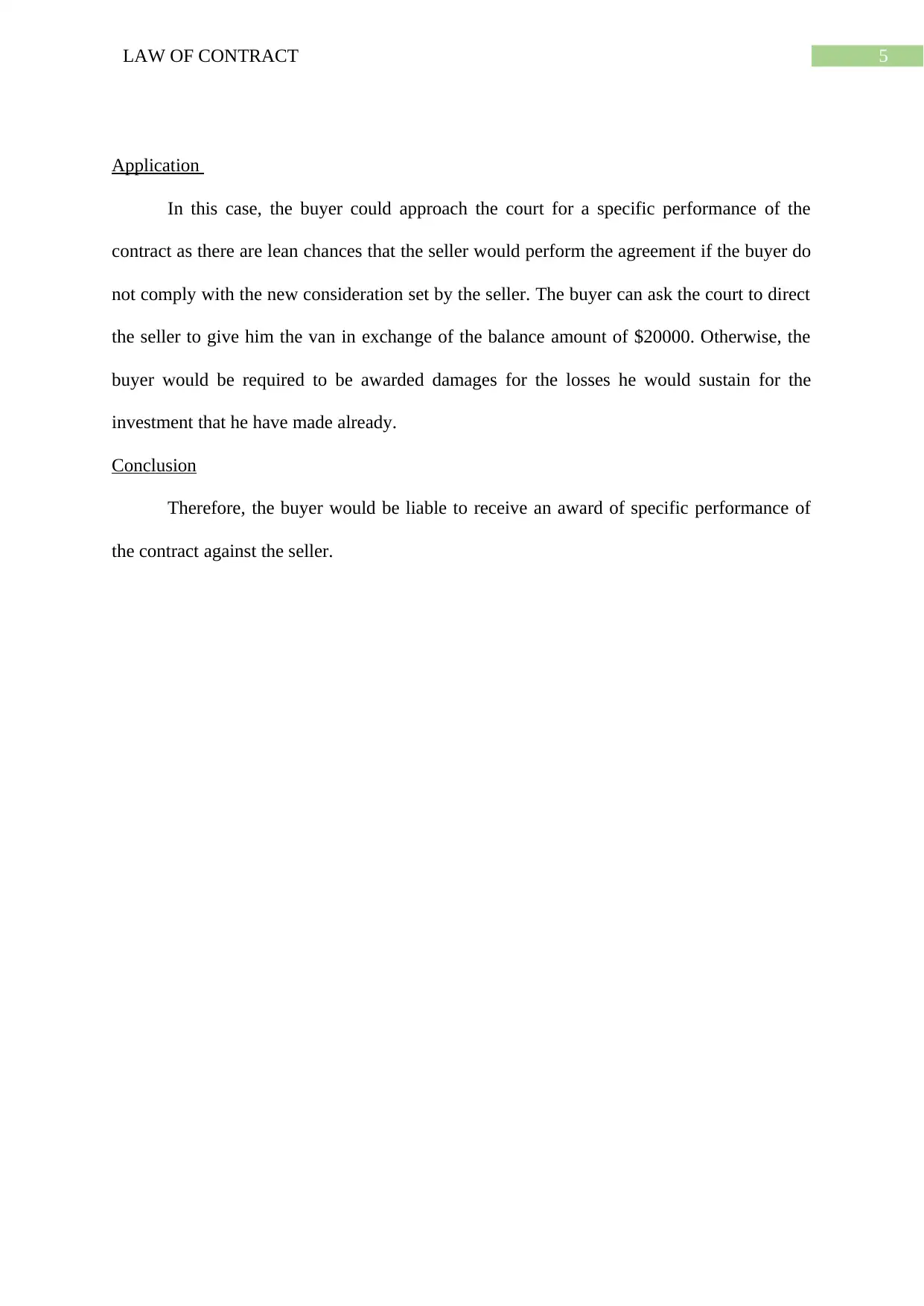
5LAW OF CONTRACT
Application
In this case, the buyer could approach the court for a specific performance of the
contract as there are lean chances that the seller would perform the agreement if the buyer do
not comply with the new consideration set by the seller. The buyer can ask the court to direct
the seller to give him the van in exchange of the balance amount of $20000. Otherwise, the
buyer would be required to be awarded damages for the losses he would sustain for the
investment that he have made already.
Conclusion
Therefore, the buyer would be liable to receive an award of specific performance of
the contract against the seller.
Application
In this case, the buyer could approach the court for a specific performance of the
contract as there are lean chances that the seller would perform the agreement if the buyer do
not comply with the new consideration set by the seller. The buyer can ask the court to direct
the seller to give him the van in exchange of the balance amount of $20000. Otherwise, the
buyer would be required to be awarded damages for the losses he would sustain for the
investment that he have made already.
Conclusion
Therefore, the buyer would be liable to receive an award of specific performance of
the contract against the seller.
⊘ This is a preview!⊘
Do you want full access?
Subscribe today to unlock all pages.

Trusted by 1+ million students worldwide
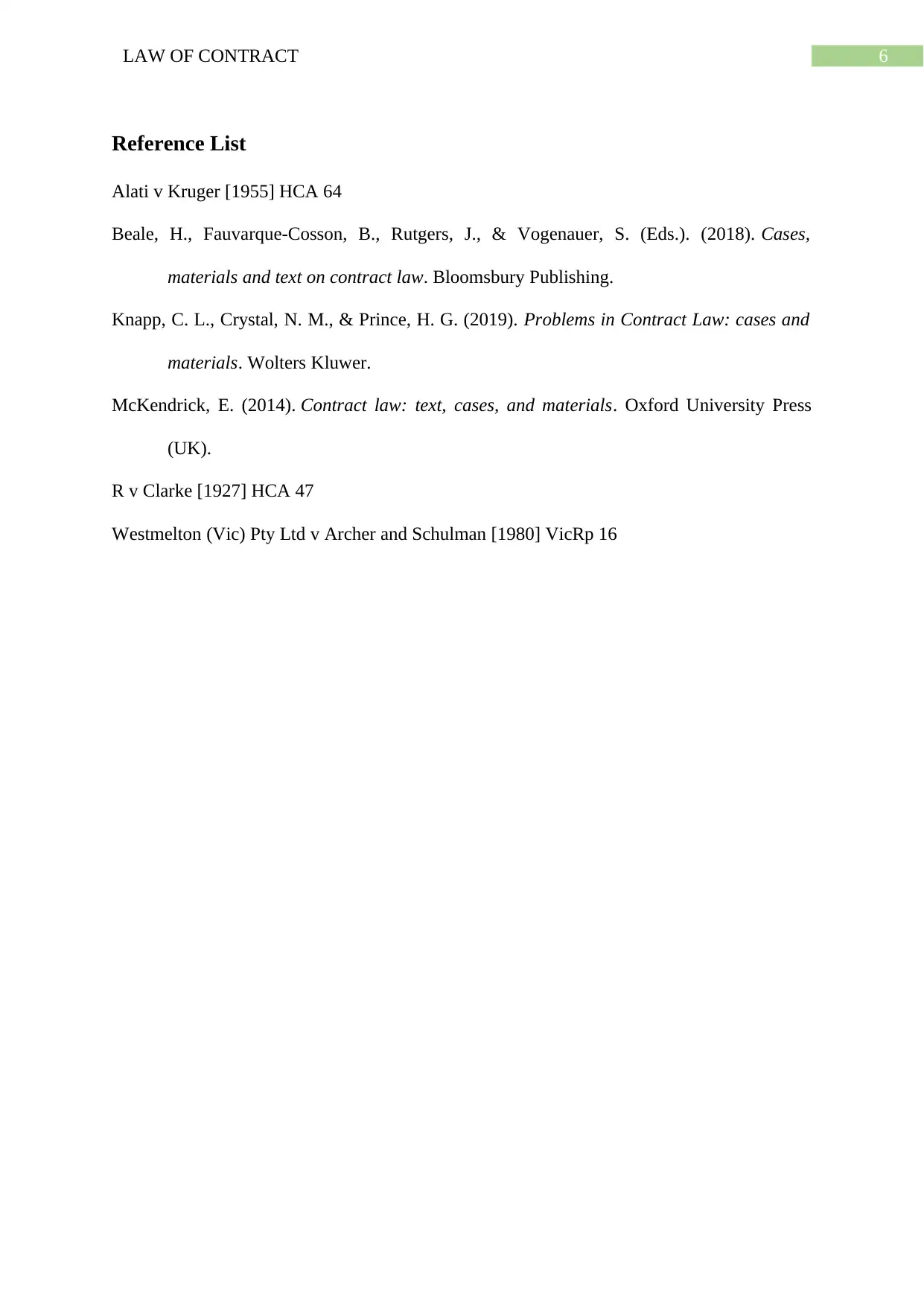
6LAW OF CONTRACT
Reference List
Alati v Kruger [1955] HCA 64
Beale, H., Fauvarque-Cosson, B., Rutgers, J., & Vogenauer, S. (Eds.). (2018). Cases,
materials and text on contract law. Bloomsbury Publishing.
Knapp, C. L., Crystal, N. M., & Prince, H. G. (2019). Problems in Contract Law: cases and
materials. Wolters Kluwer.
McKendrick, E. (2014). Contract law: text, cases, and materials. Oxford University Press
(UK).
R v Clarke [1927] HCA 47
Westmelton (Vic) Pty Ltd v Archer and Schulman [1980] VicRp 16
Reference List
Alati v Kruger [1955] HCA 64
Beale, H., Fauvarque-Cosson, B., Rutgers, J., & Vogenauer, S. (Eds.). (2018). Cases,
materials and text on contract law. Bloomsbury Publishing.
Knapp, C. L., Crystal, N. M., & Prince, H. G. (2019). Problems in Contract Law: cases and
materials. Wolters Kluwer.
McKendrick, E. (2014). Contract law: text, cases, and materials. Oxford University Press
(UK).
R v Clarke [1927] HCA 47
Westmelton (Vic) Pty Ltd v Archer and Schulman [1980] VicRp 16
1 out of 7
Related Documents
Your All-in-One AI-Powered Toolkit for Academic Success.
+13062052269
info@desklib.com
Available 24*7 on WhatsApp / Email
![[object Object]](/_next/static/media/star-bottom.7253800d.svg)
Unlock your academic potential
Copyright © 2020–2026 A2Z Services. All Rights Reserved. Developed and managed by ZUCOL.




